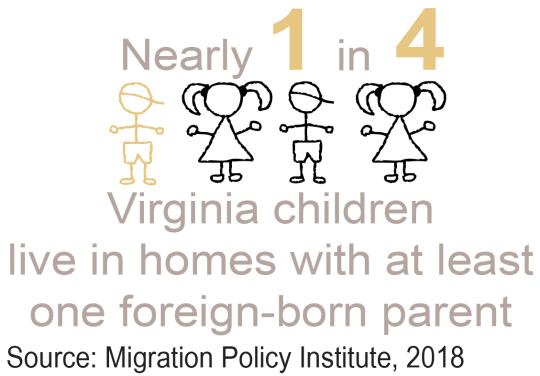March 26, 2018
Words that Hurt: Anti-Sanctuary Bills Traumatize Children and Communities
This legislative session, Virginia lawmakers adopted an anti-immigrant bill that harms immigrant families in the state while likely having no actual impact on immigration policy. The bill very much echoes the type of anti-immigrant rhetoric that is being spread at the federal level, and is described by opponents as designed specifically to send a message that immigrants are not welcome in Virginia. The legislation now awaits a decision from the governor. He should veto this unnecessary and harmful bill.
On its face, the bill (HB1257) prevents localities from implementing any ordinance, policy, or procedure that restricts the enforcement of federal immigration laws. But that wording is sufficiently vague that its impact on Virginia schools, public safety officials, and communities is unclear. At best, it would be purely symbolic, since Virginia has no “sanctuary cities.” At worst, it could be interpreted as forcing local governments to rescind existing policies that build trust between police and the communities they serve, policies like not asking crime victims and witnesses about their immigration status. Either way, this bill sends a message to immigrant communities that the state will go out of its way to not protect or value them – a message that has particularly harmful consequences for children and families.
In Virginia, nearly 1 in 4 children live in households with at least one immigrant parent. The vast majority of these children are U.S. citizens (at least 86 percent) and the majority of the parents are lawfully present. Yet, as outlined in a new groundbreaking report by the Center for Law and Social Policy (CLASP), children in immigrant families have recently experienced an increase in trauma-induced symptoms that stem from anti-immigrant rhetoric, regardless of a parent’s immigration status. That’s because kids in immigrant families often can’t tell the difference between the rhetoric they hear and whether threats of deportation apply to their family.

CLASP researchers shine a light on the harmful impact this has on young children under the age of eight. The report draws from a large multi-state survey of parents, child care providers, education providers, and public service agencies. Findings show that the impacts are severe, widespread and have surfaced since the 2016 national elections in children as young as three.
Fear by both parents and children has led to a host of new observed behaviors that harm child brain development. For example, immigrant parents are avoiding taking advantage of public benefits that they and/or their children are eligible for, such as food assistance and health care support because of fear of sharing personal information with the government. This has led to children going hungry and not receiving responsive or preventive health care.
Parents are also more hesitant to leave their homes with children for non-essential services, so kids in immigrant households are now less likely to go to libraries, parks, museums, grocery stores and retail shops – routines that broaden perspectives and help shape minds at early ages. In addition, children in immigrant families are now less likely to attend education programs. All of these factors result in children in immigrant families having fewer opportunities in life to develop skills and normal routines that will contribute to their success as stable adults.
Changing activities and routines for children can lead to heightened fear and anxiety, especially when parents making these decisions are driven by the same emotions. Research has shown that when a parent’s immigration status is not under threat, children are significantly less likely to have adjustment and/or anxiety disorders. But observers have noticed children in immigrant families exhibiting new unusual behaviors related to heightened stress, including: separation anxiety, biting fingers, bed wetting, lack of participation in school, refusing to talk and other atypical social behaviors.
We all want to create the types of communities where all Virginians can thrive and reach their potential. But when Virginia advances legislation like HB1257 with no clear purpose other than to send an unwelcoming message to immigrant families, that further contributes to an atmosphere that actively undermines families and our children. Nearly a quarter of the children in this state live in families that are likely to be affected by anti-immigrant rhetoric, and legislators need to carefully consider how their actions contribute to raising a generation in a cloud of fear and anxiety.
The governor can and should veto this needless legislation, but this bill has already contributed to damaging the public climate, and that can lead to lifelong consequences.
Category:
Immigration
